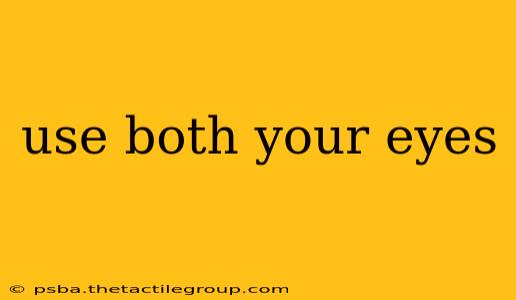We often take it for granted, but the ability to see with both eyes—binocular vision—is a remarkable feat of biological engineering. It's more than just seeing two images; it's about depth perception, spatial awareness, and a richer, more complete visual experience. This article delves into the intricacies of binocular vision, exploring its importance, potential challenges, and how to optimize its use.
What is Binocular Vision?
Binocular vision refers to the coordinated use of both eyes to create a single, three-dimensional image of the world. Unlike monocular vision (using only one eye), binocular vision leverages the slightly different perspectives each eye provides to perceive depth, distance, and the relative position of objects in space. This crucial ability allows us to navigate our environment effectively and interact with objects with precision.
The process begins in the retinas, where each eye captures a slightly different image. These images are then transmitted to the brain, which fuses them together to create a single, stereoscopic view. This fusion process is remarkably complex, relying on intricate neural pathways and brain processing power.
The Key Players in Binocular Vision:
- Eyes: Two healthy eyes are the foundational requirement.
- Optic Nerves: These transmit visual information from each eye to the brain.
- Visual Cortex: Located in the occipital lobe of the brain, this area processes visual information, including the fusion of images from both eyes.
- Oculomotor Muscles: These control the movement of the eyes, ensuring proper convergence (turning the eyes inward) and divergence (turning the eyes outward) to maintain clear focus at different distances.
The Importance of Binocular Vision
The implications of robust binocular vision extend far beyond simply seeing clearly. It's crucial for:
- Depth Perception: Accurately judging distances is essential for everyday tasks like driving, walking, and even reaching for objects.
- Spatial Awareness: Understanding the three-dimensional layout of our environment is critical for navigation and avoiding collisions.
- Hand-Eye Coordination: Precise movements requiring visual guidance, such as writing, playing sports, and performing surgery, heavily rely on binocular vision.
- Reading Comprehension: Binocular vision facilitates efficient tracking of text across a page.
Challenges and Conditions Affecting Binocular Vision
Several conditions can impair binocular vision, leading to difficulties with depth perception, eye strain, and even double vision (diplopia). These include:
- Strabismus (crossed eyes or wall eyes): A misalignment of the eyes.
- Amblyopia (lazy eye): Reduced visual acuity in one eye due to underdeveloped visual pathways.
- Convergence Insufficiency: Difficulty focusing on near objects due to weak eye muscles.
- Divergence Excess: Difficulty focusing on distant objects due to overly strong eye muscles.
Optimizing Your Binocular Vision
While many binocular vision issues require professional intervention (like seeing an ophthalmologist or optometrist), there are steps you can take to support your visual health:
- Regular Eye Exams: Early detection of problems is crucial for effective treatment.
- Healthy Lifestyle: Good nutrition, sufficient sleep, and regular exercise contribute to overall eye health.
- Proper Lighting: Adequate lighting reduces eye strain and improves visual comfort.
- Eye Exercises: Specific exercises can strengthen eye muscles and improve convergence/divergence. (Note: consult a professional before starting any eye exercises.)
Conclusion
Binocular vision is a complex yet essential aspect of our visual experience. Understanding its importance and potential challenges allows us to appreciate this remarkable biological function and take proactive steps to maintain healthy vision throughout life. Remember, regular eye exams and a focus on overall well-being are key to leveraging the full power of your binocular vision.

